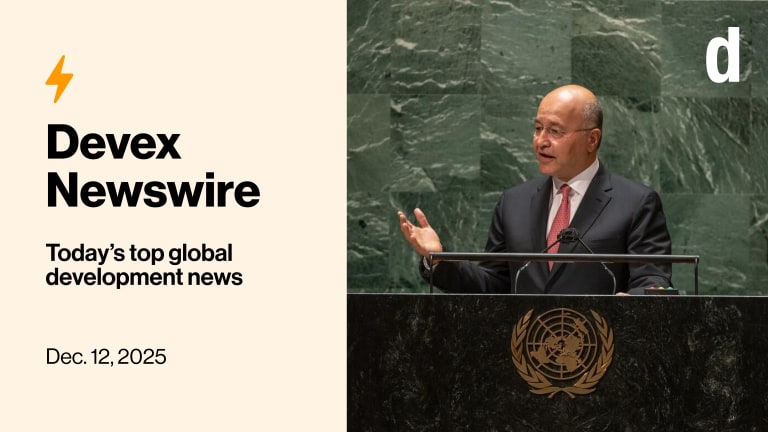
NEW YORK — Jan Egeland, secretary-general of the Norwegian Refugee Council, is accustomed to leading humanitarian emergency response work in conflict settings such as Yemen, Venezuela, and about 130 other countries. What’s new, though, is Egeland leading the agency’s growing prevention work on the novel coronavirus from his own home.
“We do what we can, as quickly as we can, in all of the places that we can. We are trying to ramp up, and we will find the money.”
— Jan Egeland, secretary-general, Norwegian Refugee CouncilEgeland, now under quarantine in Norway, spoke with Devex in a recent phone interview about the organization’s emerging response to the COVID-19 outbreak in 30 countries that are home to vulnerable, displaced, and refugee populations. Egeland warned this week of “devastating” consequences to millions of conflict-affected people if preventive action is not taken immediately.
More on COVID-19:
► COVID-19 disruptions on health supply chains a challenge for aid orgs
► To stop COVID-19 spread, Colombia halves Venezuela response services
► COVID-19 forces international aid groups to limit travel, rethink operations
“The point of our assistance is to respond to a humanitarian crisis. The point of our being is to serve people when there is war — and there is war, and there is chaos, and there is disaster. This is a disaster. This is like a war zone,” Egeland said.
This interview has been lightly condensed and edited for clarity.
What specific steps is the Norwegian Refugee Council taking to quickly develop preventative measures on the COVID-19 outbreak?
I have sent a message to all of our country teams asking them to consider how, if, and when we can ramp up water and sanitation work — which is a preventative action — and hygiene and disease control information. We can ramp up campaigns on that that do not require people to assemble, but maybe through mobile phones and online. And decongestion work for places where humanitarians are assembled.
What does decongestion work look like in practice?
It's a decongestion of cramped refugee camps and communities. That means additional shelter and quarantine areas for both vulnerable people and potentially sick people. It could mean counseling of families of people that are sick. There is one thing that is really clear in this world, which is that when there is a spread of a disease, there is blaming of minorities and blaming refugees and migrants. That is routine through the ages. I fear it will come again.
We have 14,000 aid workers. There are many countries where they are among the largest humanitarian actors. We could also consider providing logistics support to health partners.
There are a lot of things that I have asked our field colleagues to consider. There are also restrictions on travel, on assembly, on moving around, and even going to areas where there are refugees and others. And we have to protect our own staff from getting the virus, and we need to protect the communities we serve from spreading the virus. There is a window of opportunity where we can do this work.
How are government travel restrictions impacting country teams’ abilities to carry out effective preventative work within a relatively short window of time, as you say?
We have a lot of people in quarantine. I am in quarantine, after having come from Venezuela. I work from home now. We have quarantines in many of the countries where we operate. People in quarantine can also work. We have people whose programs have been suspended, and they can and must go to be reallocated to areas where we can do good work in the weeks and months ahead. Much of our staff is stuck, and they cannot travel home. They cannot travel back to their program areas.
Is enough money available to sufficiently ramp up your WASH programs, and could money from scaled-down development projects support the COVID prevention work?
I have written to all of our 40 or so institutional donors, saying that there needs to be maximum flexibility on the donor side in allowing us reallocation of funding and to direct it to these areas where we can and must take action.
Secondly, development donors, multilateral donors, and financial institutions for sure now have a lot of unspent development funding because of scaled-down projects. That is going to be needed with water, hygiene, and other work.
And then, finally, there is also risk sharing. They can ask us to go and deliver in the worst spots on Earth, but there ought to be risk sharing here as we try to cope. I spoke with the Norwegian minister of development today, and he agreed with my point that it would be too bad if there are billions of dollars unspent at the end of the year because of the corona parameters that could have been spent on corona prevention.
What are the next immediate steps the NRC is taking to execute and expand WASH preventative work and to secure this funding?
In the meetings we are having now, I basically asked each and every country: “What can you do, when can you do it, what do you need from headquarters, from donors, and the rest of the world to ramp up? We are there to help you.” And then I think the answers would be very mixed.
Some people say, “We are under lockdown.” Some people would say: “We can do a lot. We can drill boreholes tomorrow and work with latrines and water tankers tomorrow. We can have hand sanitizers in each classroom tomorrow.” It varies. We do what we can, as quickly as we can, in all of the places that we can. We are trying to ramp up, and we will find the money. I cannot see donors saying, “No, we don’t believe in this crisis.”








